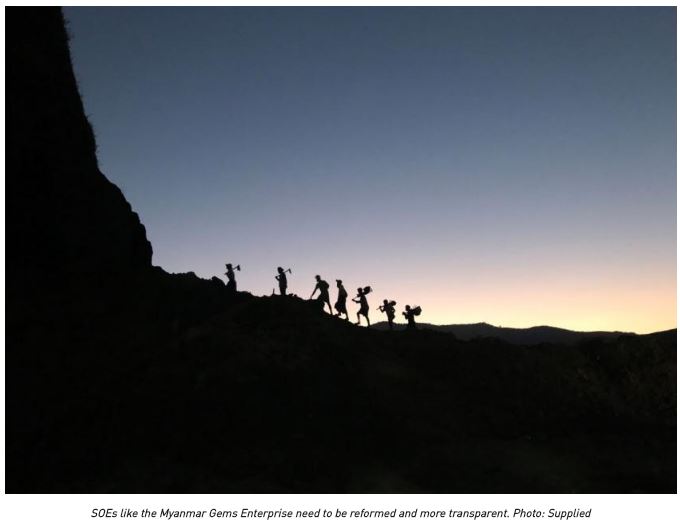Myanmar’s economic future hinges on reforming state-owned enterprises
State -Owned enterprises (SOE) play dominant roles in Myanmar’s economy. Collectively, they generate about half the government’s revenue, spend half the government’s budget, and regulate much of the formal economy – from forestry to telecommunications to mining.
Yet these entities have remained “black boxes”, with their activities and finances shrouded in secrecy.
Over the past two years, the Renaissance Institute and the Natural Resource Governance Institute have worked with the Ministry of Planning and Finance to identify concrete steps that the government can take to improve SOE performance and rationalise their finances. Through our research on natural resource SOEs, such as the Myanmar Oil and Gas Enterprise (MOGE) and Myanmar Gems Enterprise (MGE), we have discovered some remarkable facts.
For one, Myanmar’s SOEs are in many cases not SOEs in the sense they are understood in other countries. Some, like the MGE, are mainly regulators and tax collectors. Others, like Security Printing Works, provide a public service. Most have many, and sometimes contradictory, mandates. For instance, the MOGE is a passive revenue collector from offshore gas production, operates some onshore oil fields, and regulates oil and gas activities. And the Myanmar Economic Bank (MEB) is both the government’s treasurer — holding different government ministry and agency deposits — and a lender to the private sector.
Worryingly, many of the taxes collected by SOEs have been transferred to the MEB. From 2012 to January 2017, SOEs deposited K11.5 trillion (US$8.5 billion at the time) in their so-called “Other Accounts”. This money has been held by the bank as savings accounts, which do not accumulate interest for SOEs.
The rationale behind these transfers was to allow SOEs to be more financially independent. However greater savings have not improved performance. Alarmingly, some enterprises’ such as the Myanmar Port Authority and Myanmar Railways have had their accumulated savings transferred “off-budget”, while their debts and other liabilities have been absorbed by the rest of the government. Off-budget enterprises are subject to even less oversight and transparency than on-budget enterprises.
‘If the MGE collected the taxes due on jade production, it would collect at a minimum K1 trillion more than it does now. That is more than the government spent on the entire country’s healthcare last year.’
This system may represent a large misallocation of resources. Instead of being earmarked as working capital of SOEs and held by the MEB, this money could have been used to boost spending on education, healthcare and critical infrastructure through the budget.
Another issue is that the MEB now owes trillions of kyats to SOEs. Further research may be needed to better understand how the MEB manages this cash.
We also found a surprising lack of SOE oversight. We looked in detail into the finances of several of the natural resource enterprises. There is significant room for improvement — for enterprises to increase revenues, reduce costs, become more business-oriented, and ultimately serve the public interest.
We found that even some of the “profit-making” enterprises only show profits because they collect taxes and fees. In the case of the MOGE, the company seems to break even on its onshore production and may los
money on its pipelines and compressed natural gas production. However, these losses are hidden by the massive revenues collected from offshore production, which is carried out exclusively by foreign companies.
Regulatory enterprises are also underperforming. For example, less than a quarter of total transactions in the jade and gemstone sector are made through formal channels, and those stones that are price checked are only valued at 10-60 percent of their true value. In other words, if the MGE collected the taxes due on jade production, it would collect at a minimum K1 trillion more than it does now. To put these figures in context, that is more than the government spent on the entire country’s healthcare last year.
Huge unexplained expenses are also allowed to go unchecked. For instance, we found a K369 billion ($360 million) foreign exchange loss due to currency revaluation. Neither the MOGE nor the bodies meant to oversee it could explain where this money was transferred. This is not a problem specific to the MOGE; nearly all SOEs sign contracts and make payments without other bodies knowing why they were signed or made. While we do not think there was corruption in this instance, the mystery highlights serious weaknesses in SOE accounting systems.
Part of the problem is a lack of systems to properly oversee SOEs. The current State-owned Economic Enterprises Law (SEE Law) was passed in 1989 and does not establish a system of monitoring enterprise operations. And other bodies — like the Office of the Auditor General or Ministry of Planning and Finance — do not have the mandates or manpower to dig into SOE finances and activities. We therefore recommend drafting a new SEE Law and empowering the bureaucracy to effectively monitor SOEs.
Another problem is that none of the enterprises we examined had clear, measurable performance targets, public annual reports, or were subject to independent external audit. This challenge can be easily addressed by the enterprises themselves. We encourage them to learn from the examples of SOEs in Thailand, Indonesia, Chile and other countries by publishing audited financials and clarifying their plans for the future.
Government officials are well aware of these issues and have announced an intention to address them. While the government continues its work to improve the performance of these powerful institutions, we believe that the legislature, ministries and the international community have an important role to play in reform efforts. The future of Myanmar’s economy depends on it.
Andrew Bauer is consultant at the Natural Resource Governance Institute and Arkar Hein is project coordinator at Yangon-based Renaissance Institute. The two organisations have recently launched the report “State-Owned Economic Enterprise Reform: The Case of Natural Resource Enterprises”.
Source: https://www.mmtimes.com/news/myanmars-economic-future-hinges-reforming-state-owned-enterprises.html


 Thailand
Thailand




